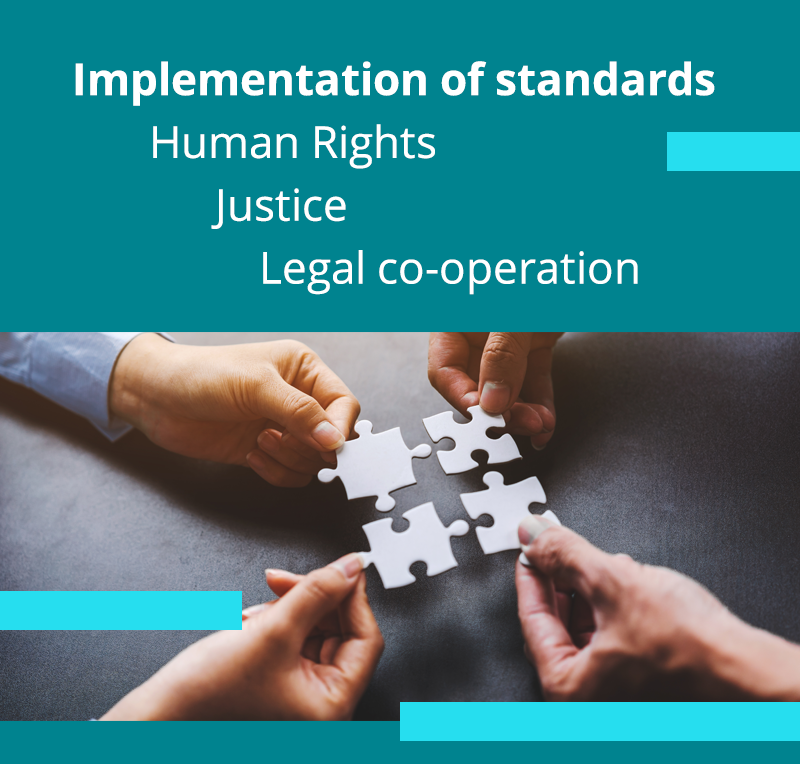Fighting ill-treatment and impunity and enhancing the application of European Court of Human Rights case-law on national level in Montenegro

The main objective is to improve the capacity of the judiciary to apply the case law of the European Court of Human Rights on national level and to enable legal professionals to more effectively combat ill-treatment and impunity.
The following results are expected:
- strengthened capacity of the Judicial Training Centre to facilitate human rights trainings for legal professionals;
- judges and legal advisors of the national courts are able to better apply European human rights standards in their daily work;
- the institutional capacity of the Constitutional Court is enhanced towards better application of the ECtHR case law;
- strengthened capacity of the Judicial Training Centre to train legal professionals on fighting ill-treatment and impunity;
- legal professionals (judges, prosecutors and lawyers) and the CSO activists are able to address more effectively issues of ill-treatment and impunity in line with the European Convention on Human Rights and the case law of the European Court of Human Rights;
- public dialogue on prevention of torture and ill-treatment in places of deprivation of liberty is enhanced through increased engagement of the CSO sector.
Project information
- Duration: 33 months (1 September 2016 – 24 May 2019)
- Place/ country: Montenegro
- Budget: 1 090 000 €
- Funding: European Union/Council of Europe Horizontal Facility for the Western Balkans and Turkey
Project documentation
Useful links
Publications
- The right to trial within reasonable time - Handbook on Article 6 of the ECHR - ENG - MON
- Prohibition of Torture and Inhuman and Degrading Treatment and Punishment - Manual on Article 3 of the ECHR - ENG - MON
- Analysis of the Impact of the Decision of the Constitutional Court of Montenegro on the System of Ordinary Courts with a Particular Focus on the Relationship between the Constitutional Court and the Supreme Court of Montenegro - ENG - MON
- Report on application of the ECHR and Fundamental Freedoms in the practice of the Supreme Court of Montenegro - MON
- Analysis of the Constitutional Court Decisions - ENG - MON
- Analysis of the Consitutional Court work targeting legal certainty and the right to a final decision - MON; Concluding Observations - ENG
- Analysis of the current legal framework in respect of effective remedies for the protection of the right to a trial within a reasonable time in administrative procedures - ENG - MON
- Analysis of the Legal Framework and Case-Law of Montenegrin Courts in the Implementation of Effective Remedies in Respect of a Trial within a Reasonable Time - ENG - MON
- An analysis of penal policy in domestic violence criminal and misdemeanor proceedings in Montenegro in 2017 - ENG - MON
Developed guidelines on effective investigations in cases of ill-treatment
With the aim to strengthen the application of the standards of effective investigations in the cases of ill-treatment at the national level, the Action had developed an instruction - guidelines on the conduct of the state prosecution and the police in investigating allegations of ill-treatment....
Montenegrin law students visit the Council of Europe institutions
Upon successful completion of the legal clinic on Article 3 of the Convention, organised under the Action, ten students participated in a study visit to the Council of Europe and the European Court of Human Rights (the Court) on 15 and 16 May 2019. The Action pays particular attention to...
Presentation of the Analysis of the penal policies in the area of domestic violence
With the aim of addressing the issues related to harmonisation of penal policies in the area of gender-based violence cases, the Action has developed a comprehensive Analysis of the legislative framework and existing court practices in relation to domestic violence. On 15 May 2019 the findings...




